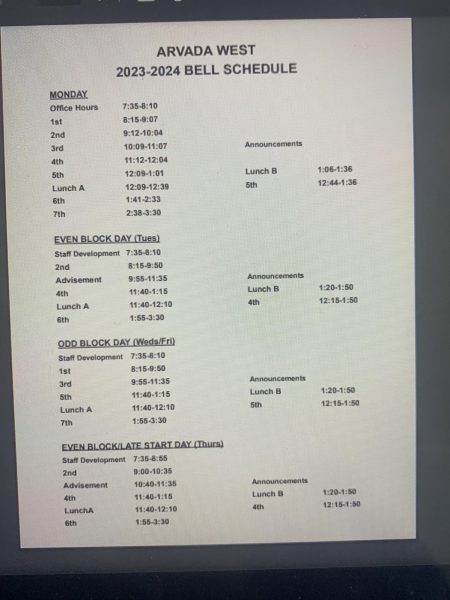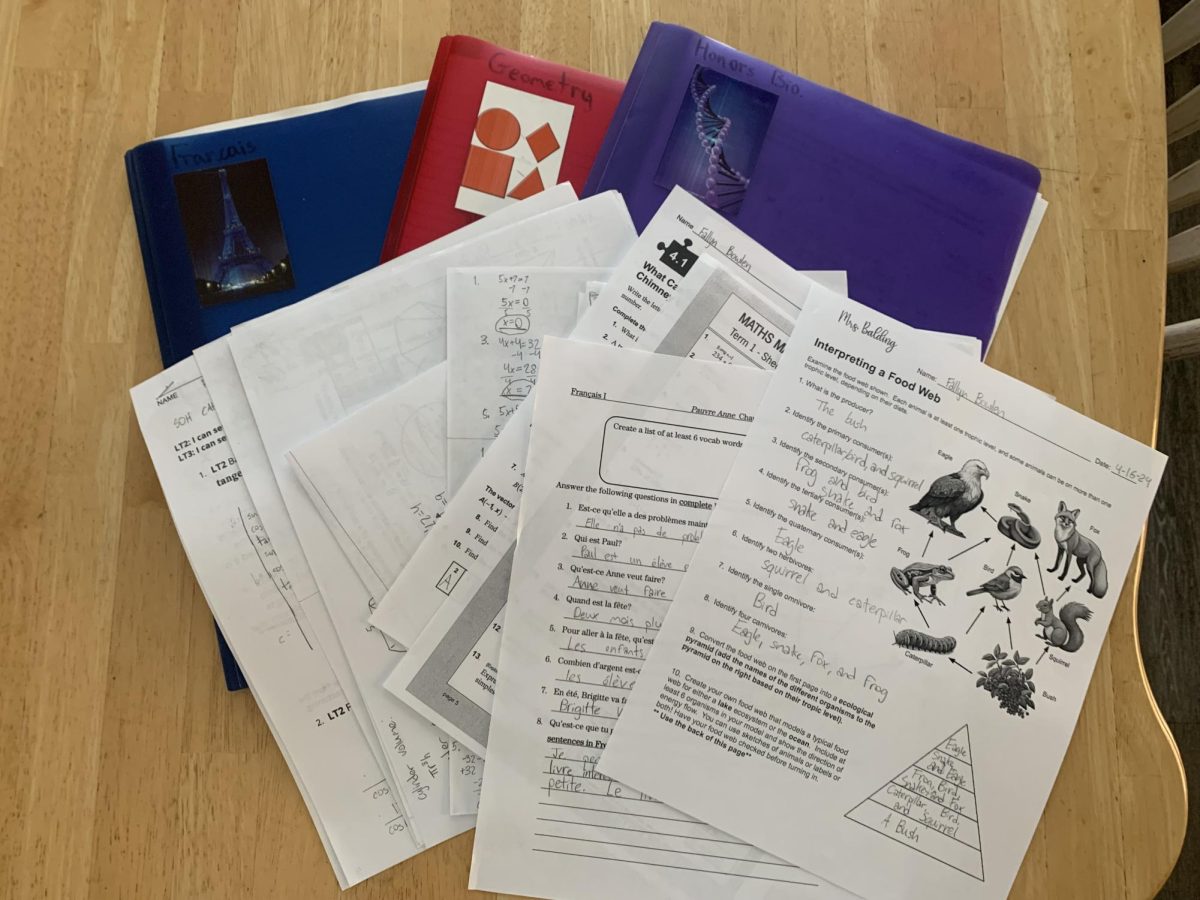Homework has long been a divisive topic between students, teachers, and parents. With all this disagreement, one thing is certain: while homework can have benefits inside and outside of the classroom, it also can have many negative effects on students.
Harris Cooper is a professor of psychology at Duke University and a writer; he is also largely known for making the “10-minute rule” which states that students should be assigned 10 minutes of homework for each grade. For example, a second grader would get 20 minutes of homework, a third grader would get 30 minutes of homework, and so on.
This rule can be helpful in determining how much homework younger grades should have but becomes less useful once it’s applied to high school. This is mainly because high schools are much less consistent with homework because of how different classes work: At Arvada West High School, students have even and odd days with half of their classes on each day.

Depending on a student’s schedule, they can have harder classes on one of the days and easier classes on the other, affecting how much homework is assigned day-to-day. With unexpected amounts of homework, students can’t be sure whether they will have free time.
Joanna Komitor, An AP US history teacher and AP world history teacher at Arvada West claims that the homework students get done depends on them, “It depends on the person and then everyone has their own ability, a different way, and different things and what they choose to put effort into or not.”
This is mostly true, a student’s free time is dependent on their abilities and how long they take to complete work. However, student’s who want free time may speed through work to get it finished while others find themselves staying up to finish work in order for it to be of good quality.
Angela Dryer, who teaches AP Lang, AP Research, and tenth-grade English agrees with Komitor. “They’re making the choice whether or not to work outside of class or not. In the end, it’s all due to if the learning matters or I have kids like only grades matter.”
A student’s motivation(or lack of it) can make or break their workload. Some students may find themselves finishing work for good grades or conducting their own research so that they understand the material while others might not care as much and could ignore the homework.
Another thing is that teachers can unknowingly make the work inconsistent. Many students have had the experience of an assignment being due at 3:30, and if teachers don’t give class time to complete the work, it can be difficult for students to find time to finish work that’s due at the end of the school day. Oftentimes, these assignments can evolve into homework and make it more stressful for students. Even if students are given class time to work, sometimes the allotted time is not always enough for an assignment to be finished, which results in homework that was not originally scheduled.
These problems can’t entirely be fixed, but it doesn’t matter because the real problem is how long the work takes. The National Center of Education Statistics reports that students in ninth through twelth grade spend an average of 6.8 hours on homework each week. It’s not an absurd amount of homework for the average student; however, for students who participate in any type of sports or extracurriculars, maintaining the balance between their club/sport, school, and sleep can be incredibly hard and draining.

Students in sports often have practice during the week, averaging around two hours per day. Other extracurriculars like theatre and instrumental music/choir also spend more time at the school for performances and often stay at the school much later in the day.
This leads to a report that states, according to the Colorado Children’s Hospital, that “Half of the teenagers report feeling tired all day. Due to their academic and athletic workloads, young athletes may get even less sleep than their peers.” Teens need more sleep than adults and it seems that even the average teen isn’t getting enough despite not having a single extracurricular.
Schools have tried to address the issue of students’ sleep by pushing back start times, but it hasn’t made much difference. Students have to spend nearly seven hours at school no matter what and a later start time would mean a later end time which would just mean later homework, later practices, and later meetings for extracurriculars. The truth is that there is not enough time in a day for students to attend school, complete homework, get enough sleep, and still have time to relax. In fact, that’s something that most adults forget about.
If students do nothing except for school and homework, there may be enough time to stay ahead of schedule, but no one is perfect and it’s crucial for teens to socialize with friends.
As CNN reports, loneliness and social isolation are linked to a “higher risk of premature death and other health outcomes.” Additionally, many benefits come from friendships and socialization, and homework should not take precedence over these aspects of life. Consequently, students may miss out on opportunities to hang out with friends simply because they feel compelled to complete homework.
High school is supposed to be the best part of a student’s life because there are still so many ways life could go, and there are so many formative experiences to be had, but when students overwork themselves just to get homework finished, or end up getting a bad grade because they choose fun over homework, the whole idea of the ‘high school experience’ crumbles. Students shouldn’t have to compromise happiness for good grades.
Chiming in, Healthline states that “more than 70 percent of students said they were ‘often or always stressed about homework.’” Should teens really be burdened with this stress just because of a perceived need for extra work? Stress can have so many negative impacts on people, and within a teen’s still-developing brain, it can affect growth.
Getting rid of homework may seem like a great way to end the boundless stress, sleepiness, exhaustion, and overworking of students; however, it would also be getting rid of the teaching of good habits, time management, and study skills that come along with it.
There is no perfect solution that completely relieves the issues of homework while accentuating the benefits, but a couple of changes to the amount of time students have to finish work could make all the difference. After all, an extra week to complete homework wouldn’t hurt anybody, would it?



